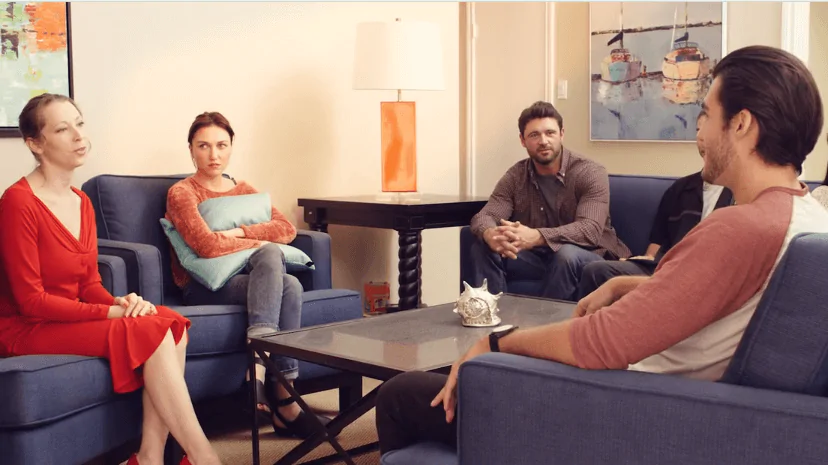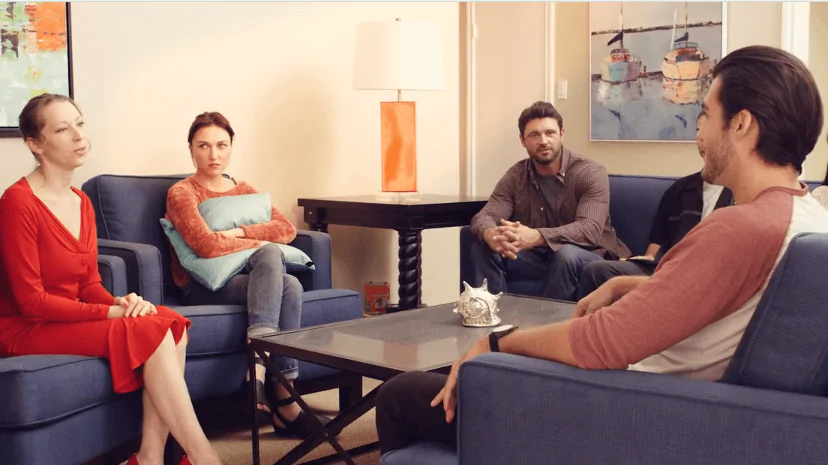24/7 Helpline:
(866) 899-221924/7 Helpline:
(866) 899-2219
Learn more about OCD Treatment centers in Ardmore
OCD Treatment in Other Cities

Other Insurance Options

Absolute Total Care

Health Partners

Evernorth

State Farm

MVP Healthcare

Covered California

MHNNet Behavioral Health

United Health Care

Aetna

Lucent

Humana

Amerigroup

BlueShield

Medical Mutual of Ohio

WellCare Health Plans

UMR

UnitedHealth Group

Cigna

Health Choice

BHS | Behavioral Health Systems

Arbuckle Life Solutions
Arbuckle Life Solutions is a non-profit rehab located in Ardmore, Oklahoma. Arbuckle Life Solutions ...

ForeverWell
ForeverWell is a private rehab located in Ardmore, Alabama. ForeverWell specializes in the treatment...

Mercy Senior Behavioral Health
Mercy Clinic Behavioral Health is located in Ardmore, Oklahoma. Mercy Clinic Behavioral Health provi...

AA – Alcoholics Anonymous
AA – Alcoholics Anonymous is a private rehab located in Ardmore, Oklahoma. AA – Alcoholics Anonymous...

Mental Health Services of Southern Oklahoma
Mental Health Services of Southern Oklahoma is a private rehab located in Ardmore, Oklahoma. Mental ...





Bradford Health Services
Bradford Health Services provides alcohol and drug rehab services to men and women throughout the co...

Family Counseling Service
Family Counseling Service is a private rehab located in Athens, Georgia. Family Counseling Service s...

Palm House Recovery
Palm House Recovery is a non-profit rehab located in Athens, Georgia. Palm House Recovery specialize...

AARC – Athens Addiction Recovery Center
Athens Best Rehab is a co-occurring mental health and substance abuse treatment center located in At...

Twin Lakes Recovery Center
Twin Lakes Recovery Center is a drug and alcohol rehab located in Monroe, GA. They provide residenti...

Alliance Recovery
Alliance Recovery Center provides outpatient medication assisted treatment for opioid use disorder a...

Centerstone
Centerstone is a private rehab located in Mooresville, Indiana. Centerstone specializes in the treat...

Centerstone – North Bevcher Drive
Centerstone – North Bevcher Drive is a private rehab located in Madison, Indiana. Centerstone – Nort...

RAPHA Healthcare Services
RAPHA Healthcare Services is a private rehab located in Mooresville, North Carolina. RAPHA Healthcar...

The John W. Clem Recovery House
The John W. Clem Recovery House is a residential rehab center located in Athens, The John W. Clem Re...

Health Recovery Services
Health Recovery Services, is a non-profit business and Drug Free Workplace serving those affected wi...

Community Counseling
Community Counseling Services offers various options for outpatient behavioral health services acros...

Centerstone – South Gallatin Road
Centerstone – South Gallatin Road is a private rehab located in Madison, Tennessee. Centerstone – So...

Volunteer Behavioral Health – Hiwassee Mental Health Center
Volunteer Behavioral Health - Hiwassee Mental Health Center is located in Athens, Tennessee. Volunte...

Monarch Health Addiction Recovery Clinics
Monarch Health Addiction Recovery Clinics is a private rehab located in Madison, Wisconsin. Monarch ...

ASAP Addiction Services and Pharmacotherapy
Addiction Services And Pharmacotherapy (ASAP) is a substance abuse treatment rehab located in Madiso...

Journey Mental Health Center
Journey Mental Health Center is a non-profit rehab located in Madison, WI. Journey Mental Health Cen...

ARC Center for Women and Children – TAP Case Management
ARC Center for Women and Children/TAP Case Management provides case management services for female s...

Integral Psychology Center
Integral Psychology Center is a private rehab located in Madison, Wisconsin. Integral Psychology Cen...

UnityPoint Health Meriter – New Start Program for Addictions
UnityPoint Health Meriter - New Start Program is an addiction rehab facility located in Madison, WI....

Journey Mental Health Center – Yahara House
Journey Mental Health Center – Yahara House is a private rehab located in Madison, Wisconsin. Journe...

ATTIC Correctional Services – South Park Street
ATTIC Correctional Services – South Park Street is a private rehab located in Madison, Wisconsin. AT...

Tellurian
Tellurian is an accredited co-occurring mental health and substance use disorder treatment center in...

Orion Family Services
Orion Family Services is a private rehab located in Madison, Wisconsin. Orion Family Services specia...

Hope Haven – North Bay Lodge
Hope Haven – North Bay Lodge is a non-profit rehab located in Madison, Wisconsin. Hope Haven – North...

Meriter Hospital – New Start Program Outpatient
UnityPoint Health, located at UnityPoint Health in Madison WI, is a reputable dual diagnosis mental ...

Psychology Center
Psychology Center is a private rehab located in Madison, Wisconsin. Psychology Center specializes in...

ARC House
ARC House is a substance abuse drug rehab center in Madison, WI for women. It is dedicated to helpin...

Madison Comprehensive Treatment Center
The Madison East Comprehensive Treatment Center (CTC) is a substance abuse treatment center in Madis...

Hope Haven – Chris Farley House
Hope Haven–Chris Farley House is a drug and alcohol rehab for adult men in Madison, Wisconsin. They ...

Monona Serenity Group
Monona Serenity Group is a non-profit facility offering 12 step meetings located in Madison, WI. Mon...

Connections Counseling
Connections Counseling is a unique and strength based clinic focused on creating a safe and supporti...

Madison West Comprehensive Treatment Center
Madison West Comprehensive Treatment Center is a private rehab located in Madison, Wisconsin. Madiso...

With in Sight Relationship Therapy
With in Sight Relationship Therapy is a private rehab located in Madison, Wisconsin. With in Sight R...

Bicycle Health – Wisconsin
Bicycle Health - Wisconsin is an online Medication Assisted Treatment Program. Bicycle Health - Wisc...

Tellurian – Detoxification Center
Tellurian – Detoxification Center is a non-profit rehab located in Madison, Wisconsin. Tellurian – D...

Meriter Hospital – Behavioral Health
Located in Madison, Wisconsin, Meriter Hospital – Behavioral Health (now called UnityPoint Health) i...











































Agape Family and Group Therapy
Oasis Counseling Services is a drug and alcohol rehab and counseling center in Madison, Alabama. The...

Athens Limestone Counseling Center
Athens Limestone Counseling Center is a private rehab located in Athens, Alabama. Athens Limestone C...

Family Life Center
Family Life Center is a non-profit rehab located in Athens, Alabama. Family Life Center specializes ...

The Center for Compassionate Recovery
The Center for Compassionate Recovery offers outpatient treatment and medication-assisted treatment ...

Drug and Alcohol Abuse Clinic
Drug and Alcohol Abuse Clinic is a private rehab located in Athens, Georgia. Drug and Alcohol Abuse ...

Christian Alcohol and Drug Help
Christian Alcohol and Drug Help is a private rehab located in Athens, Georgia. Christian Alcohol and...

AA – Alcoholics Anonymous – Milledge Avenue
AA – Alcoholics Anonymous – Milledge Avenue is a non-profit rehab located in Athens, Georgia. AA – A...

Georgia Therapy Associates
Georgia Therapy Associates is a private rehab located in Athens, Georgia. Georgia Therapy Associates...

Advantage Behavioral Health Systems – Miles Street Center
Advantage Behavioral Health Systems - Miles Street Center offers a Crisis Stabilization Unit for adu...

Advantage Behavioral Health Systems – South Milledge
Advantage Behavioral Health Systems - South Milledge provides Child and Adolescent Services, Adult M...

Athens Clarke DUI Services
Athens Clarke DUI Services provides DUI/Risk Reduction Classes and Family Counseling for offenders s...

Renewal Counseling and Consulting
Renewal Counseling and Consulting is a private rehab located in Athens, Georgia. Renewal Counseling ...

Strong Day Recovery
Strong Day Recovery is a private rehab located in Athens, Georgia. Strong Day Recovery specializes i...

Pemberton and Associates
Pemberton and Associates is a private rehab located in Athens, Georgia. Pemberton and Associates spe...

Advantage Behavioral Health Systems – Clarke County
Advantage Behavioral Health Systems - Clarke County provides case management, outpatient treatment, ...

Athens Biscayne Room
Athens Biscayne Room is a private rehab located in Athens, Georgia. Athens Biscayne Room specializes...

Chestnut Health Systems – Madison Recovery
Chestnut Health Systems - Madison Recovery provides clinical support and case management. Chestnut H...

Chestnut Health Systems – Madison Resolutions
Chestnut Health Systems - Madison Resolutions provides clinical support and case management. Chestnu...

James Wortham Counseling Services
James Wortham Counseling Services is an outpatient clinic that offers substance abuse treatment for ...

Discovery Psychotherapy Center
Discovery Psychotherapy Center is a private rehab located in Madison, New Jersey. Discovery Psychoth...

Behavioral Health Services of Lake Norman
Behavioral Health Services of Lake Norman is a private rehab located in Mooresville, NC. Behavioral ...

BK Professional Counseling Center
BK Professional Counseling Center is a counseling clinic located in Mooresville, NC. BK Professional...

Athens Counseling Services
Athens Counseling Services is a private rehab located in Athens, Ohio. Athens Counseling Services sp...

Athens Hocking and Vinton
Athens Hocking and Vinton is a private rehab located in Athens, Ohio. Athens Hocking and Vinton spec...

Behavioral Health Group – Madison
Behavioral Health Group – Madison is a private rehab located in Madison, Tennessee. Behavioral Healt...

Women at The Well
Women at The Well offers inpatient treatment for women with alcohol and/or substance addiction. The ...

JourneyPure – Restoration Counseling
Athens Suboxone is a substance abuse detox rehab located in Athens, TN for men and women. It offers ...

Andrews Center Behavioral Healthcare
Andrews Center Behavioral Healthcare is a public rehab located in Athens, Texas. Andrews Center Beha...

AA – Alcoholics Anonymous
Alcoholics Anonymous (AA) is a non-profit rehab located in Athens, Texas. Alcoholics Anonymous (AA) ...

Madison Psychotherapy
Madison Psychotherapy is a private rehab located in Madison, Wisconsin. Madison Psychotherapy specia...

Wellspring Psychotherapy and Counseling
Wellspring Psychotherapy and Counseling is a private rehab located in Madison, Wisconsin. Wellspring...

NorthStar Counseling Center
NorthStar Counseling Center is a comprehensive behavioral health treatment center in Madison, WI. Es...

Open Door Center for Change
Open Door Center for Change is a private rehab located in Madison, Wisconsin. Open Door Center for C...

AA – Alcoholics Anonymous – North Carroll Street
AA – Alcoholics Anonymous – North Carroll Street is a non-profit rehab located in Madison, Wisconsin...

Psychology Clinic
Psychology Clinic is a private rehab located in Madison, Wisconsin. Psychology Clinic specializes in...

Mental Health Resources
Mental Health Resources is a private rehab located in Madison, Wisconsin. Mental Health Resources sp...

Dane County Youth Connections
Dane County Youth Connections is a private rehab located in Madison, Wisconsin. Dane County Youth Co...

Marriage and Family Solutions
Marriage and Family Solutions is a private rehab located in Madison, Wisconsin. Marriage and Family ...

Psychotherapy and Clinical Consulting
Psychotherapy and Clinical Consulting is a private rehab located in Madison, Wisconsin. Psychotherap...

Four Lakes Psychological Services
Four Lakes Psychological Services is a private rehab located in Madison, Wisconsin. Four Lakes Psych...

Lake Monona Psychotherapy & Recovery Center
Lake Monona Psychotherapy & Recovery Center is a private rehab located in Madison, Wisconsin. Lake M...

Child and Family Psychological Services
Child and Family Psychological Services is a private rehab located in Madison, Wisconsin. Child and ...

Beverly Rehabilitation
Beverly Rehabilitation is a private rehab located in Madison, Wisconsin. Beverly Rehabilitation spec...

AA – Alcoholics Anonymous – Northport Drive
AA – Alcoholics Anonymous – Northport Drive is a non-profit rehab located in Madison, Wisconsin. AA ...

Community Care Programs
Community Care Programs is a private rehab located in Madison, Wisconsin. Community Care Programs sp...

LSS – Lutheran Social Services
Lutheran Social Services (LSS) provides outpatient mental health and substance abuse services for pe...

Journey Mental Health Center – Community Treatment Alternatives
Journey Mental Health Center – Community Treatment Alternatives is a private rehab located in Madiso...

Psychiatric Services
Psychiatric Services is a private rehab located in Madison, Wisconsin. Psychiatric Services speciali...

ARO Counseling Center
ARO Counseling Center is a private rehab located in Madison, Wisconsin. ARO Counseling Center specia...

Connections Counseling – Madison
Connections Counseling – Madison is a private rehab located in Madison, Wisconsin. Connections Couns...

Journey Mental Health Center – Gateway
Journey Mental Health Center is a CARF-accredited behavioral health treatment center in Madison, WI....

LSS – Lutheran Social Services – Off the Square Club
Lutheran Social Services (LSS) - Off the Square Club is a daytime resource center for anyone living ...

Tellurian – Chandra’s House of Hope (Women’s Sober Living)
Tellurian – Chandra’s House of Hope (Women’s Sober Living) is a non-profit rehab located in Madison,...

Chiron Limited
Chiron Limited is a private rehab located in Madison, Wisconsin. Chiron Limited specializes in the t...

Journey Mental Health Center – Kajsiab House
Journey Mental Health Center – Kajsiab House is a private rehab located in Madison, Wisconsin. Journ...

Journey Mental Health Center – Fordem Connections
Journey Mental Health Center – Fordem Connections is a private rehab located in Madison, Wisconsin. ...

ARC RESPECT Project
ARC RESPECT Project provides a safe space and peer support as well as advocacy, case management, cou...









































































